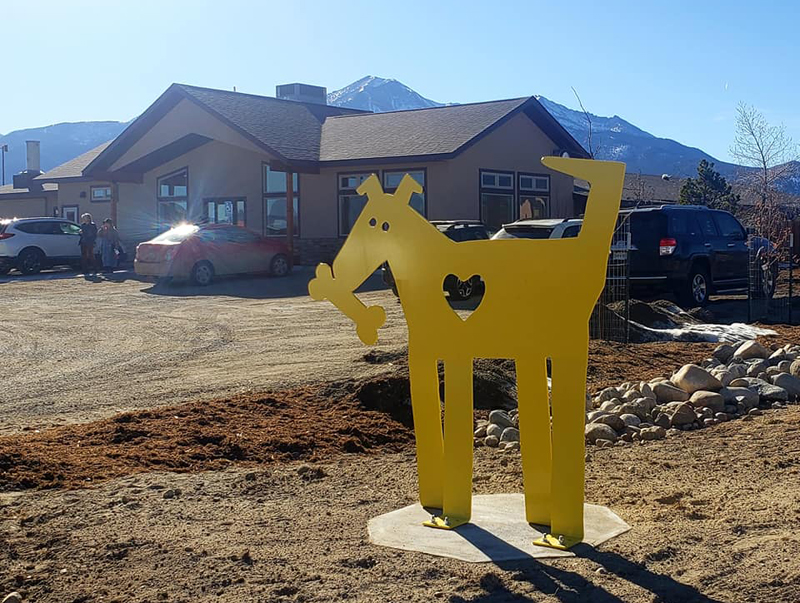The Ark-Valley Humane society has issued a statement regarding an animal relinquishment incident that occurred last week.
From Ark-Valley Humane Society’s Executive Direct Amber Vanleuken:
The purpose of this press release is to provide a factual timeline and additional information to our community and the public about a recent event that transpired at our facility.
Ark Valley Humane Society’s (AVHS) mission is to ensure the welfare of companion animals through compassion and care. The way we conduct care, what we stand for and our policies are all in place to protect animal and human lives.
Echo, a 170-pound Great Dane-Mastiff mix, was brought to Ark-Valley Humane Society by his owners on Thursday, February 2nd for the purpose of relinquishing him to the shelter. His owners informed AVHS staff that they had been trying to rehome Echo unsuccessfully for more than a year. They explained that they had raised Echo from a puppy and that he used to be good with people and other dogs, but his behavior began to change for the worse about 1 1⁄2 years ago.
During the relinquishment process, the owners reported that Echo had previously charged and bitten a person, and had also bitten another dog and injured a puppy. They reported that he needed to be muzzled at the veterinarian, is wary of children and triggered by their high energy, shows aggression when meeting other dogs, and has escaped a six-foot fence by climbing over or digging under it.
Before deciding to relinquish Echo, the owners inquired about the possibility of euthanasia and were told by staff that while occurrences are rare, AVHS does humanely euthanize dogs with severe behavioral issues that are deemed unsafe. The owners were told that this was a possible outcome for Echo. At no point did AVHS staff indicate that in the case of euthanasia, the owners would be given the option of having him returned to them.
When a person relinquishes a pet to the shelter, part of that process includes them signing the relinquishment document that states AVHS may euthanize to protect the safety of others, that they are transferring ownership to AVHS by relinquishing the animal, and that AVHS is responsible for deciding the final outcome.
Following the relinquishment and the owners leaving the facility on Thursday, and in the course of routine handling, without warning, Echo bit two staff members. This is extremely unusual behavior for a dog. Our experienced staff members handle and work with hundreds of dogs every year, and are trained not only for basic dog handling, but also how to identify dog body language and work with shy and fearful dogs, administer exams, vaccination, and draw blood for tests. Echo’s behavior was scary and unsettling for staff involved, as the bites were sudden and without warning during a period of handling where Echo initially appeared relaxed and friendly.
Echo’s aggressive behavior became unpredictable. Echo immediately escalated to biting without first displaying other warning signals such as creating distance by backing away or growling. Within a few minutes during handling by staff, Echo went from relaxed, friendly, and sociable, to stiff and growling, only to return back to relaxed and sociable and then escalated immediately to biting with heavy pressure. These bites occurred in a large room where Echo had ample space to move away.
Immediately following the bites, Echo was secured in a large kennel. A 10-day post-bite quarantine was initiated. Domestic dogs involved in a human bite must be quarantined for a 10-day observation period to eliminate the risk of rabies virus transmission per Colorado Department of Public Health and Environment. The kennel Echo was originally placed in, and is currently housed in, is 5 foot by 12 feet, and is 6 feet tall, where he has had ample space to walk, move and lay down. During the quarantine period, no staff handling is permitted.
AVHS is a minimal euthanasia facility with an Asilomar live release rate of 98.26% in 2022. However, in rare instances, we humanely euthanize animals for severe medical conditions and behavioral issues when considered dangerous to public safety.
The decision to humanely euthanize a dog based on behavioral problems considers both the quality of life of the dog, and the relative manageability of the unsafe behaviors that are either reported by a surrendering party or observed at the shelter, or both.
In considering a euthanasia decision, AVHS assesses reported and observed behaviors related to:
- Territorial guarding
- Generalized guarding
- Unpredictability
- Known triggers
- History of human-directed aggression
- History of animal-directed aggression, and
- Any other notable behaviors of concern such as history of escape.
AVHS also consults with a veterinarian before making the determination to euthanize. Sadly, Echo has exhibited dangerous behaviors in all categories and would pose a clear public safety risk, as his owners stated he is wary of children, shows aggression when meeting other dogs, and has escaped their premises. The public places its trust in AVHS to make decisions with these safety concerns in mind, and as an animal welfare organization, we could not in good faith allow Echo to be returned under these current conditions with potential to harm children, adults or other dogs. AVHS exhausts all resources and options before coming to this conclusion, as it is one of the most difficult decisions we make as an organization.
After calling Echo’s previous owners to discuss these concerns over the phone, they arrived at the shelter and demanded that Echo be returned to them that day, despite him being on a mandatory post-bite quarantine. They stated that if returned to them, they would promise to keep Echo secured in their house without access to a yard or other people to ensure that he cannot harm others. They admitted to him being a safety risk, and that their concerns for him being around other people resulted in them not being able to find a suitable home for him to go to prior to relinquishing to AVHS. After a long conversation, they refused to leave the shelter without Echo, and unfortunately had to be escorted out by the police after additional threats were made to staff.
AVHS engaged a lawyer for further review of the situation. After reviewing the information, the lawyer counseled that AVHS should not return Echo to the previous owners because he poses a clear public safety risk, and allowing him back into the public, with his aggressive behavior and potential to escape his premises, would be negligent on the part of AVHS to do so.
As we take on the responsibilities of saving animal lives through rescue and adoption, we also aim to protect human and animal lives from harm. By doing so, we are following the Tenets of Socially Conscious Sheltering and prioritizing the health and safety of animals and those living in our community.
For questions, please contact Amber Vanleuken at avanleuken@ark-valley.org.
About Ark-Valley Humane Society
Founded in 1991, Ark-Valley Humane Society advocates for the welfare of all animals through compassion and care. With an Asilomar Live Release Rate of 98%, Ark-Valley Humane Society is dedicated to providing each animal with the care they deserve and the hope for a second chance. Over 1,833 animals were helped in 2022 through our programs & services. Our vision for the future is a safe and humane world for all companion animals.





